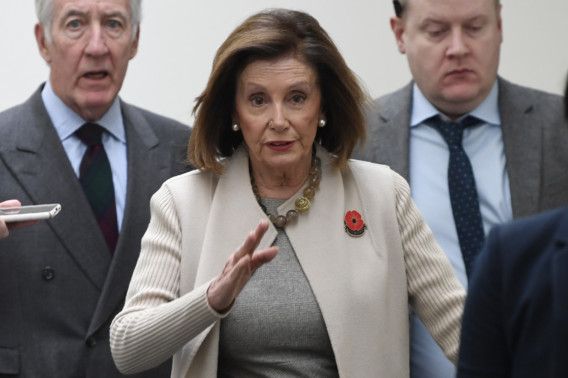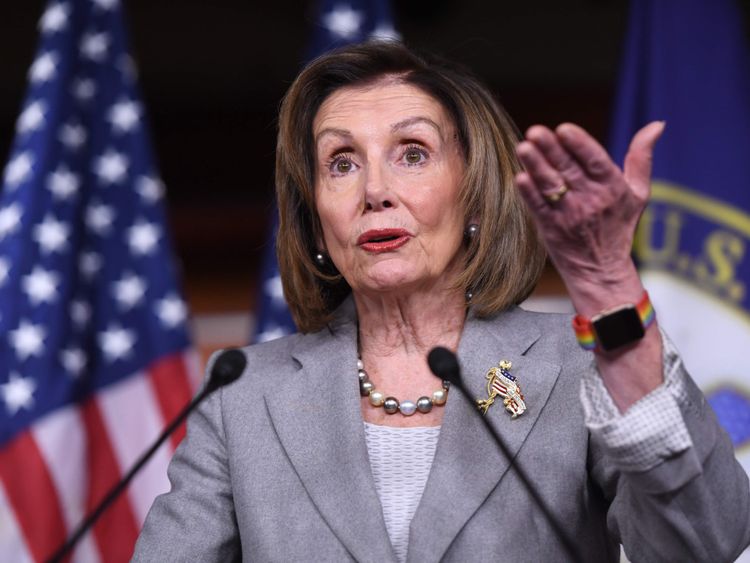Washington: When Nancy Pelosi first held the speaker’s gavel in 2007, liberals in her caucus wanted to impeach President George W Bush over the Iraq War. Pelosi resisted.
More than a decade later, the San Francisco Democrat returned to the speaker’s rostrum with a new Democratic majority, hearing similar calls to impeach a Republican president.
This time, too, she resisted for months. But President Donald Trump, she insists, left her no choice.
Trump’s offences, she said in an interview Tuesday in the speaker’s office, justified impeachment in a way Bush’s had not.
“What could be worse than that? Misrepresenting to the public what the basis of the war was,” Pelosi said.
But, she continued, Trump’s efforts to enlist a foreign government, Ukraine, in domestic US politics, asking the Ukrainian president to investigate Trump’s Democratic rivals, “is so overwhelming that for us to not do this would be a dereliction of our own duties.”
Legacy
The process Pelosi set in motion when she said the House would begin the impeachment is now on the eve of completion. Lawmakers are scheduled to open debate Wednesday on an impeachment resolution that is all but certain to pass on a near-party-line vote.
With that vote, impeachment will stand as a key part of her legacy, her colleagues agree — along with becoming the country’s first female speaker of the House and shepherding the Affordable Care Act into law.
Republicans, who have defended the president, say the impeachment effort will put the Democratic majority at risk.
The impeachment vote “will be a stain on Nancy Pelosi’s legacy as speaker,” said Rep. Steve Scalise, R-La, denouncing what he called “a personal vendetta against the president.”
Different picture
Pelosi’s allies paint a very different picture.
“All this is coming out now because, as Nancy says, ‘the times have found us,’” said former California Sen. Barbara Boxer, a friend of Pelosi’s. “The times have found her.”
In the eyes of Democrats, Boxer added, the speaker has become “the chief antagonist or the chief opponent to the man who has taken a wrecking ball to America.”
That position wasn’t ordained a year ago.
When Pelosi’s party regained the majority in 2016, a small but vocal faction of Democrats was calling for her to step aside. Her initial months back in the speaker’s office were marked by tension between progressives and moderates among the sometimes unruly House Democrats.
Members on the party’s left “were rambunctious; they assumed the caucus would get in their way. So they spoke out,” said former Rep. George Miller, a longtime ally of Pelosi’s.
Pop culture symbol
Paradoxically, however, impeachment, which many saw as a divisive issue, has caused Pelosi’s party to coalesce around her. Critics who just a year ago said she should step aside have put their trust in her political instincts, saying the House would have been rolled by Trump under a less powerful speaker.
And to the surprise of some Democrats, who considered her out of touch with a younger generation in the party, Pelosi has become a pop culture symbol of Democratic resistance by standing up to the president on live television or even just by walking out of the White House in a fashionable coat.
“In her whole career, she has always prided herself on being measured. But the times she has stepped out of that measured status have been blockbusters,” said Rep. Jackie Speier, D-Calif, a Pelosi ally. “I think she has found a newer voice — to be used sparingly but effectively.”
Pelosi has insisted all along that Democrats are not impeaching Trump because of politics. Disagreements over separation of children from their families at the border, gun control or climate change need to be resolved at the ballot box, she said.
“Impeachment, politics — [they] have nothing to do with each other,” she repeated in the interview.
But politics is an inevitable part of impeachment. If Democrats hold the House majority in November and defeat Trump for reelection, Pelosi’s management of the process will garner political credit. If they fail, she will take much of the blame. In the year ahead, preserving the House’s Democratic majority will be her top political responsibility.
She insists the prospect doesn’t worry her.
“We’re on a good path with all of that. If impeachment never existed, we would still have to be protecting our incumbents,” she said.
Effective
One measure of Pelosi’s effectiveness: She has clearly gotten under Trump’s skin. The president once avoided personal attacks on Pelosi, but in recent weeks has dropped that deference, repeatedly referring to her as “crazy,” and recently insulting her teeth.
On Tuesday, in a vitriolic six-page letter, he accused her of lying about her faith.
“You are offending Americans of faith by continually saying ‘I pray for the President,’ when you know this statement is not true, unless it is meant in a negative sense,” Trump wrote.
“You are making a mockery of impeachment, and you are scarcely concealing your hatred of me, of the Republican Party, and tens of millions of patriotic Americans,” he wrote.
Pelosi said she has prayed for whoever the president is and has felt it important to say that publicly.
“I don’t hate anybody. And if I were to ever resort to such an emotion, I wouldn’t waste it on him,” she said in the interview. “It is not something that’s in my upbringing or my character.”
Mass
Pelosi’s allies say she attends Roman Catholic Mass regularly, including on foreign trips with other lawmakers. Last weekend she went with Republicans and Democrats to Mass at St. Alphonse Church in Luxembourg.
“I prayed for [Trump] that God — that his heart will receive God’s grace to help everyone in our country, not just the privileged few, which seems to be the course that he is on,” Pelosi said.
The decision to open an impeachment inquiry came after a hectic weekend in late September filled with church services — a memorial for Pelosi’s longtime friend, journalist Cokie Roberts, and the funeral for Emily Clyburn, the wife of House Whip James E. Clyburn of South Carolina. As Pelosi flew from Washington to South Carolina and then to New York, she drafted the speech she would give announcing the decision — at one point losing her notes on a plane.
The announcement on Sept. 24 came before television cameras in a hallway off the speaker’s office — a space typically reserved for high-level announcements. From there, she sent the investigation to six House committees, primarily the House Intelligence Committee that she once helped lead, now headed by her close ally, Chairman Adam B Schiff, D-Calif.
Schiff said Pelosi was “deeply engaged” in the investigation but “never attempted to micromanage.”
“What she has done is consult with the chairs of the various committees, and try to arrive at consensus,” he said.
Bridging disputes
Pelosi succeeded in bridging disputes among Democrats over how broad the articles of impeachment should be — and how quickly to move. Democrats close to her describe a process of constant communication with members, whether on the phone or in person on the House floor. That has allowed her to act as a barometer, measuring the pressure on the lawmakers.
“I know people think she goes up there and cracks the whip,” said John Lawrence, who was Pelosi’s chief of staff from 2005 to 2013. “That’s just not the case.”
She “derives her strength from the fact people believe — regardless whether the final decision reflects personal preference — they were able to make their case and had opportunity to be consulted.”
Support
Pelosi, however, has also developed a level of support among Democratic voters that she did not have a year ago, when even many Democratic conceded that she was an electoral liability in some congressional districts. By wagging her finger at the president during a meeting in the Oval Office and merely exiting the White House in a stylish orange coat, she has become the subject of memes and political logos.
Those moments were spontaneous, she says.
“All of them [are] a part of something vis-a-vis him,” she said. “It was really more about him than about me.”
She didn’t wear the burnt-orange coat with a collar — one that she bought for the inauguration of Barack Obama — to make a point, she said.
“No, it was clean, it was warm,” she said. “Being from California, I don’t have many real winter coats.”
Pelosi has said she considered retirement when it appeared Hillary Clinton would defeat Trump in 2016. When Trump won, she stayed on to protect the Affordable Care Act, the piece of legislation Pelosi counts as her top legislative accomplishment.
She refused to speculate on whether she would once again think of stepping down if a Democrat wins in 2020.
“I have no intention of weakening the position I’m in now by making myself a lame duck for what comes next,” she said. “When that comes, we’ll see.”
But when the day comes, there’s little chance she’d remain in Washington as many former politicians do, she says.
“Every single day that I leave,” she said of her San Francisco district, “it’s enticing to stay in California.”














